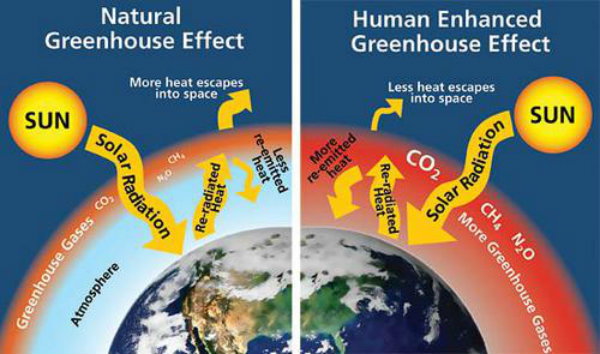Editorial Note: EarthTechling is running special expanded coverage today of the new UN climate report and its implications. To read the latest from us and our editorial partners, go here.
The Intergovernmental Panel on Climate Change (IPCC) recently released its fifth report on the state of our planet. The multi-country panel was designed to assess and synthesize scientific research from around the globe to paint a complete picture of what’s changing and why. Unfortunately, the latest installment of this research shows that things are getting worse–not better–and is more confident than ever that human behavior is the culprit.
Yes, some climate fluctuations have always occurred naturally over time: it heats up, and usually cools down. This is very convenient for those who’d rather believe the planet is going through hot flashes, rather than suffering from a dangerous, unending fever. Only the willfully ignorant could still believe that after reading the IPCC report: The planet is careening toward a brick wall of global warming, and humans are behind the wheel. Read on for three ways we’re all making climate change worse.

“It is extremely likely [95 percent confidence] more than half of the observed increase in global average surface temperature from 1951 to 2010 was caused by the anthropogenic increase in greenhouse gas concentrations and other anthropogenic forcings together,” states the fifth IPCC report.
So what exactly are we doing that’s creating this increase in planet-killing greenhouse gas concentrations?
1. Using Too Much Dirty Energy
Over 70 percent of our electricity comes from burning fossil fuels, mostly coal and natural gas, and this filthy business is responsible for over 30 percent of greenhouse gas emissions in the U.S. alone.
2. Driving Too Much
How many times are you the only one in the car? How often do you make trips of 2 miles or less? Do you speed? Or drive an inefficient vehicle like an SUV or sports car? Behaviors like these are wasteful in their own right, but now imagine them multiplied by several billion. According to the EPA, over 90 percent of the fuel used for transportation is petroleum based, contributing over 28 percent of our greenhouse gas emissions.
3. Wasting Food
Just last week it was revealed that food waste is a massive source of greenhouse gas emissions. A new report published by the United Nations Food and Agriculture Organization found that after the United States and China, wasted food rotting in landfills is the third largest global contributor to CO2 emissions and therefore climate change.
We can do it!
It’s not possible for everyone to just start generating their own clean energy, but behaviors two and three are perfectly within the control of each and every one of us to change.
We can stop those pointless driving trips by replacing them with walks, biking trips, or public transportation whenever possible. Thanks to car sharing and bike sharing programs, it might even be possible to give up your car altogether.
We can stop wasting food by ignoring the misleading sell-by dates and keeping food that’s still edible. Modify the amount of food we make for each meal, limiting leftovers. Can’t use produce before it goes rotten? Find a way to preserve it. Can’t use all the canned goods in your pantry? Donate them.
The IPCC report isn’t a theory or a suggestion: It’s a dire warning. We heed warnings every day, and it saves our lives. Will we heed this one?